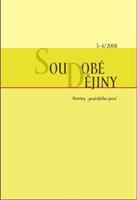Dva tisice slov: Zrod a důsledky nečekaně vlivneho provolani
‘Two-thousands Words’: The Origin and Impact of an Unexpectedly Influential Manifesto
Author(s): Jakub KončelíkSubject(s): History
Published by: AV ČR - Akademie věd České republiky - Ústav pro soudobé dějiny
Summary/Abstract: The author reconstructs the writing, publication, reception, and consequences of the ‘Dva tisice slov’ (Two-thousand Words) manifesto, which is among the best expressions of nascent civil society in Czechoslovakia in 1968. It was drafted by a group of scientists (the chemist Otto Wichterle, the physicians Otakar Poupa, Jan Brod, and Bohumil Sekla, the biologist-poet Miroslav Holub, and probably others), and was shaped by the novelist Ludvik Vaculik into a brilliant condemnation of the Communist regime in Czechoslovakia. ‘Two-thousand Words’ was published in late June 1968 with dozens of signatories, almost all of whom were well-known figures in the influential Literarni listy (Literature Weekly) and also in several dailies (including, in English, the 16 July 1968 edition of The Guardian). On the one hand the manifesto attracted the enthusiastic attention of the public, as is attested by the great number of published responses, and also, indeed mainly, by a spontaneous wave of signatures sent to newspapers, which within a few days numbered at least 120,000. On the other hand, the manifesto called forth the displeasure of the political elite in rare unity, for they perceived it as an opposition programme. The leadership of the Czechoslovak Communist Party therefore condemned the manifesto, leading to a debate about its interpretation. This meant a turning point in setting the boundaries of freedom of expression for journalists in summer 1968. The journalists had not respected the orders of the Communist leadership, which had recently lifted censorship, and together with the public supported the manifesto. The reaction was, however, by far not limited to Czechoslovakia. For the Soviet leadership and their allies in the Warsaw Pact ‘Two-thousand Words’ was evidence that the Czechoslovak Communist Party had lost its leading role in the mass media and that ‘counter-revolutionary forces’ were gaining the upper hand in Czechoslovakia. At talks with Alexander Dubček and other Communist politicians they also repeatedly used the manifesto to apply political pressure. At the beginning of ‘Normalization’ policy, in 1969, the manifesto was called the embodiment of the ‘counter-revolutionary efforts’, and its authors and signatories were prosecuted. Today ‘Two-thousand Words’ is one of the most important documents and symbols of the Prague Spring. The article is followed by fi ve documents: the ‘Two-thousand Words’ manifesto, Antonin J. Liehm’s ‘Jen několik slov’ (Just a Few Words), and Ludvik Vaculik’s ‘Omluva o 992 slovech’ (A 992-Word Apology) from the summer of 1968, a list of the first signatories of the manifesto, and a report on the investigation into its writing, which was ordered by the Czechoslovak Communist leadership in 1969.
Journal: Soudobé Dějiny
- Issue Year: XV/2008
- Issue No: 03-04
- Page Range: 485-544
- Page Count: 60
- Language: Czech

